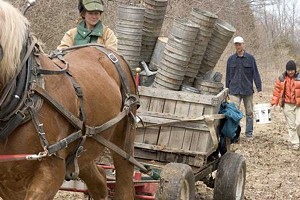Published March 25, 2009 at 4:24 a.m.
Mark Kimball likes to boast that if you eat nothing but his food, you won’t get scurvy. That sort of talk may not woo the farmers-market crowd, but he doesn’t have to worry: Kimball, his wife, Kristin, and their four full-time employees are busy milking cows, raising beef, milling grain and boiling sap for the dozens of people who flock to their Essex, N.Y., farm every Friday.
The Kimballs moved to this North Country site six years ago with $18,000 and a dozen chickens. Mark, a tall 36-year-old, can’t really explain how they acquired 75 year-round “members” and a following of college-educated farmworkers who each receive $8800 a year. But however it came to be, he says, Essex Farm is likely the only horse-powered, “full food” CSA in the world: That is, with help from six Belgian draft horses, the Kimballs and their crew produce most of the calories they need to survive.
At 3 p.m. on a recent Friday, Kimball is preparing for the farm’s weekly member open house. A typical New England CSA — a farm practicing “community supported agriculture” — offers a mix of vegetables and other products, such as cheese and bread. But the Essex Farm “full diet” includes many of the local ingredients you’d find at a natural foods co-op. Today in the Kimball’s unheated basement, for example, crates hold milk, eggs, carrots, beets, garlic, grains and flour. Inside a nearby meat trailer, a butcher fills tins with ground pork from locally raised pigs.
How is it all rationed out? As Kimball explains, Essex Farm is “free choice,” meaning individuals pay an annual $2800 for the right to take as much food as they like each week. (A couple pays $5200; kids under 13 eat for free.) Since 12 of the Kimballs’ 75 members pay on a sliding scale, the two try to make up the difference by soliciting informal grants and donations.
“Our goal then, as now, was to provide our members with year-round access to food produced on our farm, in unlimited quantity and with enough variety that they wouldn’t need to go to the grocery store at all,” Kristen Kimball wrote on RodaleInstitute.org in 2005. “That meant building a highly diversified farm right away, which turned out to be an extremely complex proposition.”
When the Kimballs moved here in November 2003, this land hadn’t been cover-cropped in two decades, and a few on-farm buildings were in rough shape. The couple began plowing, buying animals and demolishing dilapidated structures. Seven “pioneer” members bought farm shares the following spring. By fall, the newly married couple was producing more veggies than members could consume.
“The stress was incredible! That we both made it through the first season here without permanent injury and still in love is a miracle,” recalls Kristen, a Harvard-educated former travel writer who met her husband while interviewing him on a Pennsylvania farm. “At the same time, I felt like I had discovered something no less profound than the secret to happiness.”
Over the years, the Kimballs have hired employees and increased their production. They currently log, tap and hay on about three-fifths of the 500 acres of pasture and forest that abut their white farmhouse. Last year, Mark reports, a local property owner sold them 80 of the 500 acres for $105,000. He and Kristen would like to acquire the rest when they have more money, he says, but they are still struggling to break even and pay off their mortgage.
Attempting to farm so much land with draft horses is “ridiculous,” Kimball admits while unharnessing a pair of Belgian horses in his barn. But despite the emotional and financial hardship, he and Kristen don’t plan to get any more mechanized. In fact, they are trying to sell the metal tractor gear lying on the ground outside this barn. “My wife thinks we’re nuts,” Kimball says of their horse-powered ambitions. “But she also likes what we’re doing.”
Raised by back-to-the-landers and educated at Swarthmore College, Kimball has the freewheeling bravado of a California surfer. (He does windsurf on nearby Lake Champlain.) But farming remains his true passion — he has visited hundreds of farms across the United States and worked the soil in places as farflung as Venezuela and India. Although he speaks at organic agriculture conferences and was featured in a 2005 Gourmet magazine story by Vermont author Bill McKibben, Kimball insists that Essex Farm is less a model of “alternative agriculture” than a return to common sense.
“‘CSA’ sounds like hippie jargon,” he says with a wry chuckle. “We set out to meet our own dietary needs, and figured one way to pay for it was to sell our diet to other people.”
As Kimball talks, his unpaved parking lot fills with luxury sedans, Subaru wagons and dusty pickups. Out of a nondescript white van steps Tom Duca, the self-described “unofficial mayor” of Essex. Duca, who wears jeans and a baseball cap, says he has watched lots of farms fold since moving to the town in 1974. Six years ago, after hearing that young people were starting a farm down the road, the 52-year-old general contractor stopped by to say hey. Duca was a vegetarian at the time, but once the Kimballs explained their “full food” vision, he signed on ... as a carnivore.
Today Duca heads straight for Essex Farm’s state-sanctioned “Meat World” — a white trailer equipped with an arsenal of mean-looking hooks. He greets Sam Ehrenfeld, a mohawked 23-year-old whose formal-seeming tie contrasts with his rugged canvas pants. “Is it an all-sausage day?” Duca asks, bending down to sniff a tin of sage-flavored breakfast meat. Ehrenfeld looks up from a marbled slab of hog and smiles. “Sausage and bacon!”
A few days later, Duca fields a reporter’s phone call while eating sausage, cornbread and onions from Essex Farm. He says the Kimballs are an integral part of the local community (both are volunteer firefighters) and that old-timers are happy to watch them work the land. “This is Mark and Kristen’s home,” Duca says. “I hope they’ll make me food for the rest of my life.”
Town Supervisor Ron Jackson lives across Route 22 from Essex Farm and is old enough to remember each of the five owners who have cycled through since the 1950s. Jackson, who chairs the Essex County Republican Party, says the Kimball’s farm-share model isn’t just good for neighbors; “it has advantages if you’re concerned about global energy consumption, carbon footprints and global warming.”
Moreover, Jackson says, the Kimballs have inspired a new generation of young farmers. One such protégé is Paige Atkinson, a 27-year-old Yale grad who worked at Essex Farm during the 2007 growing season. The following year, Atkinson raised animals and veggies at nearby Black Kettle Farm. Now she and two friends are launching a new venture, Fledging Crow Farm, in Keysville. They expect to feed 30 households and sell at area farmers markets.
Atkinson recalls that she first visited Essex Farm while on a field trip with kids from Lake Placid’s North Country School. Before long, the studio art major was feeding the Kimballs’ horses and hogs. Atkinson says the skills she honed on the Kimball property are proving useful in Keysville, and that she’d like to emulate the couple’s full-diet business model in due time.
“I felt like I learned more working at that farm than I learned every single day that I went to college,” Atkinson reflects.
The Kimballs’ operation still faces challenges. If they don’t get 20 new members signed up by summer, Mark explains, they may have to cut back on grain production. Then there are the unexpected snafus. Today, for example, as Kimball stacks his maple syrup evaporator with firewood, a neighbor tinkers with a pipe from a crater-sized hole dug out next to the house. An underground leak has left the Kimballs’ farmhouse waterless for 36 hours.
The contrast between primal satisfaction and endless stress continues to fascinate Kristen Kimball. You might say this farm is her muse: Though busy caring for the couple’s 18-month-old daughter, she is writing a book for a major publishing house about her unexpected transition from single New York reporter to hardscrabble farmer.
When Kristen first met Mark, a “lanky, hyperkinetic vegetable grower,” on a Pennsylvania farm in 2002, she was outlining a book about small-scale agriculture. The one she’s writing now — tentatively titled The Dirty Life — “argues that food is a reasonable centerpiece to a good life,” she says. Such a life, adds the Harvard alum, is one that “many readers romanticize or fantasize about but very few will live.”
Mark agrees, but explains it differently. Farming isn’t a “charity,” he asserts, but a business where success is measured by quality of life, financial viability and the health of animals and soils. He claims that some CSA managers take themselves too seriously. While he sometimes quotes writer-farmer Wendell Berry, Kimball adds, he doesn’t pray to the “god of tofu.”
While he talks, Kimball slurps raw sap from a metal cup. His stainless steel evaporator is beginning to steam, and the pavilion where the farmer stands smells faintly of maple syrup. If not for the Subarus in his muddy parking lot, this scene would resemble a faded Polaroid from the 1970s.
“We came here poor and with no equipment,” Kimball says with a laugh. “Now we’re this ridiculous enterprise.”
From The Dirty Life by Kristen Kimball, forthcoming from Scribner in 2010:
Four winters I’ve slept in this bed, and still, sometimes, I wonder how I came to be here, someone’s wife, in an old farmhouse in the North Country. There are still moments when I feel like an actor in a play. The real me stays out until 4, wears heels and carries a bag, but this character I’m playing gets up at 4, wears Carhartts and carries a Leatherman, and the other day, doing laundry, a pair of .22 long shells fell out of her pocket, and she was supposed to act like she wasn’t surprised. Instead of the lights and sounds of the city, I’m surrounded by five hundred acres that are blanketed tonight in mist and clouds, and this farm is a whole world darker and quieter, more beautiful and more brutal than I could have imagined the country to be.
Tonight, curled against Mark’s body under the goosedown comforter, I hear a cold winter rain begin to fall. Mark is already asleep, and I lie awake for awhile, wondering if any of the cows will have the bad luck to calve in such nasty weather, if the pigs have enough straw in their hut to stay warm, if the horses are comfortable in the pasture or if they’d be better off in the barn. I worry that the rain is melting the snow cover, exposing the garlic and the perennials to the harsh cold that is sure to come back to bite them before the winter is out. These are the kinds of thoughts that have occupied the majority of the human race for most of the history of the world, and it occurs to me that I am one of them now. The agrarians. The commonest of the common people. Except that in our time, in our particular place, we’ve become as rare as radishes and pomegranates.
More By This Author
Speaking of...
-

Q&A: Howard Fisher Delivers Meals on Wheels With a Side of Good Cheer
Dec 20, 2023 -

Video: Howard Fisher Delivers Meals on Wheels
Dec 14, 2023 -

Q&A: Alexis Dexter Rescued 57 Shelter Cats During the July Flood
Sep 13, 2023 -

Video: Two Months After the Flood, Alexis Dexter Rebuilds Kitty Korner Café in Barre and Continues to Rescue Cats
Sep 7, 2023 -

Video: Saying Goodbye to Burlington’s Penny Cluse Café
Nov 17, 2022 - More »
Comments
Comments are closed.
From 2014-2020, Seven Days allowed readers to comment on all stories posted on our website. While we've appreciated the suggestions and insights, right now Seven Days is prioritizing our core mission — producing high-quality, responsible local journalism — over moderating online debates between readers.
To criticize, correct or praise our reporting, please send us a letter to the editor or send us a tip. We’ll check it out and report the results.
Online comments may return when we have better tech tools for managing them. Thanks for reading.













































